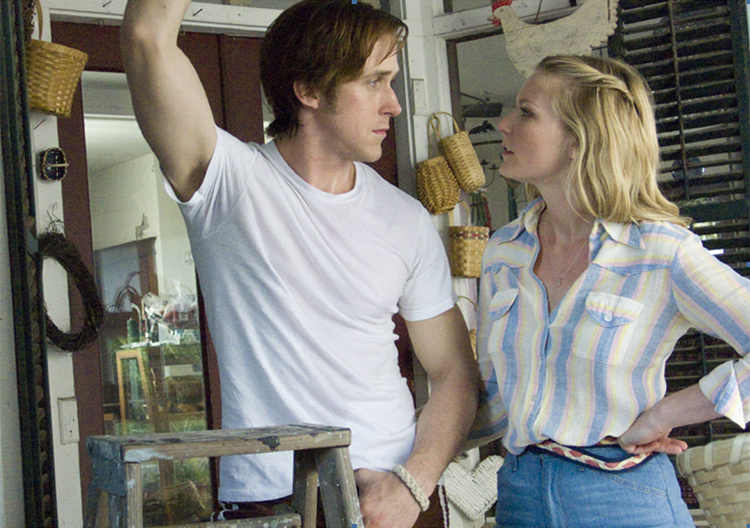In her new film “All Good Things,” Kirsten Dunst plays a character who is murdered, maybe. She certainly disappears. The movie is based on a true story of a poor girl who married into a rich family and vanished into thin air. For an actor, that’s a little like playing the Road Runner. You’re moving straight ahead and then suddenly the road disappears. Or you do.
The movie co-stars Ryan Gosling as her husband, who undergoes a Jekyll and Hyde transformation, and Frank Langella as his controlling father who owns sleazy 42nd Street real estate. Dunst’s character ends up being married to a stranger. He was a rich kid from Manhattan, they lived a rural idyll in Vermont, and when they moved back to the city it fell apart.
“When you’re enmeshed in a relationship with someone who’s so dark, you start to become crazy and dark yourself,” she told me. “She was powerful in her own darkness and I feel like toward the end she wants to kill him inside — just as much as what the real end result was, that he may have killed her.”
In real life, the husband was never charged in connection with her disappearance.
“Whatever happened,” she said, “he had something to do with it. I think that if someone is capable of dismembering one person’s body, he’s certainly capable of murdering someone else. If your daughter-in-law or your wife went missing and you had the money to do whatever you could to go find her, you’d be more proactive. You wouldn’t wait a couple of days before you reported her missing to the police.”
The film, based on the real-life stories of Robert and Kathie Durst, was directed by Andrew Jarecki, who made the 2003 documentary “Capturing The Friedmans” (2003). That was a film about a family with almost unbelievable secrets. The father and one son were cooperating in the sexual abuse of children, and went undetected for years.
“Andrew and I spent a long time kind of getting into the psychological reasoning for what made her stay in the marriage,” Dunst told me in a telephone interview. “Andrew really understands family dynamics, especially the darker side of a family. In ‘Capturing the Friedmans’ and also in this, you have really intense pressures to do what’s expected of you. Andrew himself is from a pretty wealthy family and didn’t want to go down the path his father wanted him to go down. I think that Andrew understands the real psychological issues within the family unit and how dark they can be.”
Dunst will stay on the dark side in her new film, “Melancholia,” by Lars von Trier. It’s a dark science fiction thriller also starring Charlotte Gainsborough, who, you will recall, survived the ordeal of “Antichrist,” in which she was an Eve cast out of Paradise. Von Trier, now in postproduction, is keeping plot details of the new film a secret.
“I did talk to Charlotte, actually a little bit about ‘Antichrist,’ ” she said, “but I know it was a very emotional, difficult film for her to do. Working with Lars for me was a very wonderful experience. He creates an environment that leaves you with a lot of freedom. He shoots very quickly and even shoots the rehearsals and it all feels very free. There are no big lighting setups or anything like that so you really can say it’s an intense process for eight hours; there’s no big breaks or anything like that so it keeps the fluidity of the performance on this continual cycle that doesn’t break and can make things feel so much more real. We got to improvise a lot. It was very freeing for me.”
Also coming out in 2011: “On the Road,” with Dunst joining A cast that reads like a collection of beat images: Steve Buscemi, Kristen Stewart, Viggo Mortensen, Terrence Howard, Amy Adams. The adaptation of Jack Kerouac’s American classic road novel will be directed by Brazil’s Walter Salles, who made “The Motorcycle Diaries” (2004) about another on the roader, Che Guevara.












